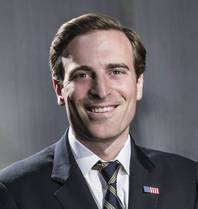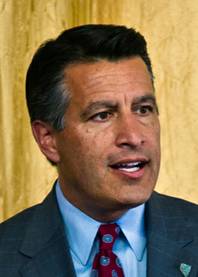Friday, Feb. 23, 2018 | 4:52 p.m.
View more of the Sun's opinion section

Adam Laxalt

Gov. Brian Sandoval
Nevada Attorney General Adam Laxalt’s chummy relationship with the National Rifle Association may win him votes in his campaign for governor, but it may not help him or Gov. Brian Sandoval in a lawsuit involving gun background checks in Nevada.
The suit, filed 11 days after the Oct. 1 shooting, claims that Sandoval has failed to take appropriate steps to implement a background check ballot question approved by Nevada voters in November 2016.
During a hearing Friday in Clark County District Court, the plaintiffs’ lead attorney stressed that since the passage of the question, there has been just one phone call between state officials and the Federal Bureau of Investigation regarding implementation — and that call was from a Nevada Department of Public Safety official, not Sandoval or Laxalt.
“The state has done nothing that you would expect them to do to effectuate this law,” said the attorney, Mark Ferrario. He later said, “What should have happened is that instead of resisting implementation ... the state should have been advocating for passage of the law. All we’re asking the governor to do is acknowledge the will of the people and advocate for the state of Nevada.”
The ballot question, which passed by a narrow margin, called for sales between private individuals at gun shows, via connections on the internet and in other situations to be subject to checks that would be performed by the FBI. It was an expansion of existing background checks, which are conducted by the state on sales involving licensed firearms dealers.
But implementation was stymied when the FBI sent a letter to state officials saying that it would not accept responsibility for conducting the background checks. That letter prompted Laxalt to issue an opinion in December 2016 saying the ballot initiative was unenforceable.
The plaintiffs in the suit, three proponents of the ballot measure, argue that other states have adopted hybrid systems for gun background checks, with some performed by the FBI and others by the state, or had gone from handling some checks at the state level to handing over responsibility entirely to federal officials.
There’s no reason that Nevada shouldn’t try to negotiate with the FBI to adopt the same approach, the plaintiffs claim.
Sandoval in 2013 vetoed a bill passed by the Legislature to expand background checks, and Laxalt actively campaigned against the ballot question in 2016. Laxalt, who spoke at the NRA national convention in 2017 and was on the schedule to address the organization’s May 4 NRA Annual Leadership Forum until his name was removed from the event this week, said he opposed the measure because it was legally flawed.
But Ferrario mentioned Laxalt’s opposition to District Court Judge Joe Hardy Jr. during the hearing, and also contended that Laxalt’s December 2016 opinion was based on a false presumption. After that opinion, Ferrario said, the issue lay dormant until Sandoval, facing pressure on it after the Oct. 1 shooting, sent Laxalt a letter seeking legal guidance on whether Nevada could develop a hybrid system.
“For either personal or political reasons, the governor and the attorney general chose to sit back and do nothing” until the Oct. 1 tragedy, he said.
The plaintiffs claim that as a result of the state’s inaction, the outcome of the issue is the opposite of what voters demanded: Fewer background checks are now being conducted. The reason is that before the ballot question, checks were allowed but not required for sales involving non-licensed sellers, but now those checks have been halted due to Laxalt’s opinion.
The plaintiffs are: Dale Zusi, a U.S. Army veteran and one of the nation’s first female ROTC scholarship students; Vicki DeLaTorre, a Nevada gun owner; and Sydney Gordon, a Clark County resident who served in Vietnam. All worked on the campaign to pass the measure.
Nevada Solicitor General Lawrence VanDyke, representing Sandoval and Laxalt, told Hardy the system defined in the ballot question wasn’t the same as those in other states where the FBI conducts some checks, and that federal officials told the state four previous times dating to 2013 that it would not conduct the expanded checks.
VanDyke said voters “passed a defective law” and asked why the plaintiffs were suing state officials and not the FBI if they believed federal officials should be required to conduct the checks.
But Ferrario said Sandoval’s request to Laxalt in October showed that he recognized the possibility of creating a hybrid system. He said Sandoval should be ordered to engage with federal officials and either request or demand that they carry out the checks.
“We want the governor to enforce a law that was passed by the citizens of this state,” he said.
Hardy did not rule on the hearing from the bench, saying he would weigh the arguments and issue a ruling at a later time.
